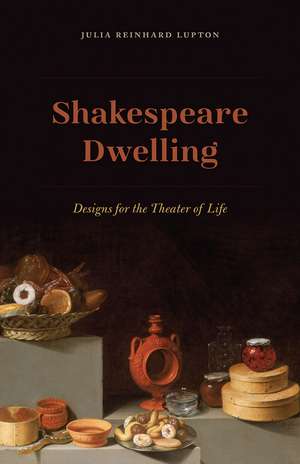Shakespeare Dwelling: Designs for the Theater of Life
Autor Professor Julia Reinhard Luptonen Limba Engleză Paperback – 13 mai 2018
Great halls and hovels, dove-houses and sheepcotes, mountain cells and seaside shelters—these are some of the spaces in which Shakespearean characters gather to dwell, and to test their connections with one another and their worlds. Julia Reinhard Lupton enters Shakespeare’s dwelling places in search of insights into the most fundamental human problems.
Focusing on five works (Romeo and Juliet, Macbeth, Pericles, Cymbeline, and The Winter’s Tale), Lupton remakes the concept of dwelling by drawing on a variety of sources, including modern design theory, Renaissance treatises on husbandry and housekeeping, and the philosophies of Hannah Arendt and Martin Heidegger. The resulting synthesis not only offers a new entry point into the contemporary study of environments; it also shows how Shakespeare’s works help us continue to make sense of our primal creaturely need for shelter.
Focusing on five works (Romeo and Juliet, Macbeth, Pericles, Cymbeline, and The Winter’s Tale), Lupton remakes the concept of dwelling by drawing on a variety of sources, including modern design theory, Renaissance treatises on husbandry and housekeeping, and the philosophies of Hannah Arendt and Martin Heidegger. The resulting synthesis not only offers a new entry point into the contemporary study of environments; it also shows how Shakespeare’s works help us continue to make sense of our primal creaturely need for shelter.
Preț: 150.70 lei
Preț vechi: 184.71 lei
-18% Nou
Puncte Express: 226
Preț estimativ în valută:
28.84€ • 29.79$ • 24.00£
28.84€ • 29.79$ • 24.00£
Carte indisponibilă temporar
Doresc să fiu notificat când acest titlu va fi disponibil:
Se trimite...
Preluare comenzi: 021 569.72.76
Specificații
ISBN-13: 9780226540917
ISBN-10: 022654091X
Pagini: 272
Ilustrații: 5 halftones
Dimensiuni: 140 x 216 x 18 mm
Greutate: 0.36 kg
Ediția:1
Editura: University of Chicago Press
Colecția University of Chicago Press
ISBN-10: 022654091X
Pagini: 272
Ilustrații: 5 halftones
Dimensiuni: 140 x 216 x 18 mm
Greutate: 0.36 kg
Ediția:1
Editura: University of Chicago Press
Colecția University of Chicago Press
Cuprins
Introduction: Entries into Dwelling
1 Reading Dramaturgy in Romeo and Juliet2 Macbeth against Dwelling
3 Grace and Place in Pericles
4 Nativity and Natality in Cymbeline
5 Room for Dessert in The Winter’s Tale
Epilogue: Fight Call
Acknowledgments
Bibliography
Index
Acknowledgments
Bibliography
Index
Recenzii
"Recent developments in political theory, philosophy and ecocriticism have drawn attention to the vibrant world of objects. Building on earlier work by Jane Bennett, Timothy Morton and Bruno Latour, Julia Reinhard Lupton’s Shakespeare Dwelling: Designs for the Theater of Life is an original and compelling intervention in this lively critical field. Inviting us to look afresh at some of the everyday objects in Shakespeare’s drama, Lupton persuasively argues for the vital properties of, torches, beds, blankets, platters, puddings, daggers, and marzipan. . . . Shakespeare Dwelling is an impressive tour de force which surveys a remarkable range of influences on Shakespearean dramaturgy. The book will attract a wide readership from students and academics studying literature, philosophy, theology, design theory, food studies, and the history of the workforce."
"Infrastructure, design, climate change, environmental friendliness, the politics of hospitality—these issues are everywhere. In Shakespeare Dwelling, Lupton brings her characteristic originality of vision to bear on the role played by a variety of interpersonal bonds when it comes to understanding our relation to the material world, as well as the self-relations required in our relations to objects. She does this by treating us to eye-opening readings of Shakespeare--her specialty--without ever losing sight of what Shakespeare was watching: the 'theater of life.'"
"Shakespeare Dwelling takes its place in a trilogy that started with Citizen-Saints and continued in Thinking with Shakespeare. Together the three books offer an extended meditation on interfaces among politics, life, and literature (especially drama, and especially Shakespeare) that is, in my judgment, largely unmatched since the collapse of Modernism and the fading from view of public intellectuals like Lionel Trilling. Such ambitions, as Julia demonstrates, are still possible."
"This immensely resourceful, deeply inventive book should be a touchstone in Shakespeare Studies, and for new humanistic work. It generously affords us new ways of imagining Shakespeare’s astonishingly syncretic dramaturgy. Lupton has already taught us how to think with Shakespeare; here she helps us co-habit the generative locales of his work, bringing together threads of phenomenology, architecture, house-keeping, and theology in a characteristically exuberant set of reflections.”
"In Shakespeare Dwelling Julia Reinhard Lupton offers an account of the spaces and sites that Shakespeare’s characters inhabit and, crucially, the way in which these spaces come to shape human interaction, social meaning, and the theatrical experience. . . . Lupton covers new and exciting methodological ground by bringing together an eclectic range of theoretical underpinnings to her analysis."
"This methodologically significant book engages a topic of much recent interest: things and space in the architectural settings of literary works. Its importance lies in the provocative new way it enlists design theory to analyze the spaces of Shakespeare’s plays as places of habitation. Lupton is sensitive to, and draws on, ecocriticism, antihumanist theory, and the 'posthuman turn', all of which challenge human privilege over the world of animals and things. Nevertheless, even in her copious appeal to environmentally oriented object theory to study lived space in Shakespeare, she presents an avowedly humanist view: put simply, her approach is based on the notion that people build structures to achieve the fullness of their humanity and engage with the world around them. The importance of the book rests in its spirited application of this approach to Shakespeare’s spatial environments."
